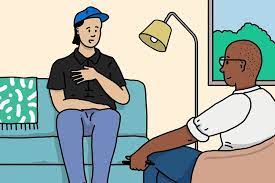Mental health is an essential component of overall well-being, but it’s often overlooked or stigmatized.
Many people struggle with mental health issues at some point in their lives, and recognizing when to seek professional help is crucial for managing these challenges effectively.
In this article, we will explore the signs that indicate the need for professional assistance and the various mental health professionals available to provide support.
Recognizing the Signs
Persistent Symptoms
One of the most significant indicators that it’s time to seek professional help for mental health is the persistence of symptoms.
If you find that your emotional or psychological distress has been ongoing for an extended period, it’s essential to consult with a mental health professional.
This may include symptoms like;
- prolonged sadness
- anxiety
- mood swings,
- intrusive thoughts.
Impact on Daily Life: When your mental health struggles start interfering with your daily life, it’s time to seek help.
If you find it challenging to maintain your job, relationships, or engage in everyday activities due to your emotional well-being, professional intervention becomes necessary.
Isolation and Withdrawal: A growing sense of isolation, withdrawal from social interactions, or a decline in your support system is a red flag for seeking professional help.
When you begin to isolate yourself due to mental health issues, it’s crucial to reach out for support.
Substance Abuse: Self-medicating with drugs or alcohol is a common response to mental health problems.
If you find yourself relying on substances to cope with emotional distress, it’s time to consult a mental health professional who can provide healthier alternatives.
Changes in Sleep and Appetite: Significant changes in sleep patterns or appetite, whether excessive or insufficient, can indicate underlying mental health issues. Persistent insomnia or overeating may signal the need for professional guidance.
Suicidal Thoughts or Self-Harm: If you ever experience thoughts of self-harm or suicide, this is an urgent sign to seek professional help immediately. Do not hesitate to reach out to a crisis hotline, therapist, or psychiatrist for assistance.
Types of Mental Health Professionals
Once you recognize the signs that you or someone you know requires professional help, it’s essential to know the types of mental health professionals available to provide support:
Therapists and Counselors: Therapists and counselors offer talk therapy and can help individuals address various mental health issues. They can include psychologists, social workers, and licensed professional counselors.
Psychiatrists: Psychiatrists are medical doctors who specialize in mental health. They can diagnose mental health conditions, prescribe medication, and provide a combination of therapy and medication management.
Psychologists: Psychologists are trained to assess and diagnose mental health conditions. They primarily provide psychological counseling and therapy to help individuals manage their emotional challenges.
Psychiatric Nurses: Psychiatric nurses work closely with psychiatrists to provide medication management, education, and support for individuals with mental health conditions.
Support Groups: Support groups, led by trained facilitators or peers, can provide a sense of community and shared experiences for individuals dealing with similar mental health challenges.
Crisis Hotlines: Various crisis hotlines, such as the National Suicide Prevention Lifeline, are available 24/7 to provide immediate support and guidance during mental health emergencies.
Conclusion
Recognizing when to seek professional help for mental health is a critical step towards improved well-being. It’s important to remember that seeking help is a sign of strength, not weakness.
Mental health professionals are trained to provide the necessary support and treatment to help individuals cope with their mental health challenges and lead healthier, more fulfilling lives.
If you or someone you know is struggling with mental health issues, don’t hesitate to reach out for assistance. Your mental health matters, and there is help available.

